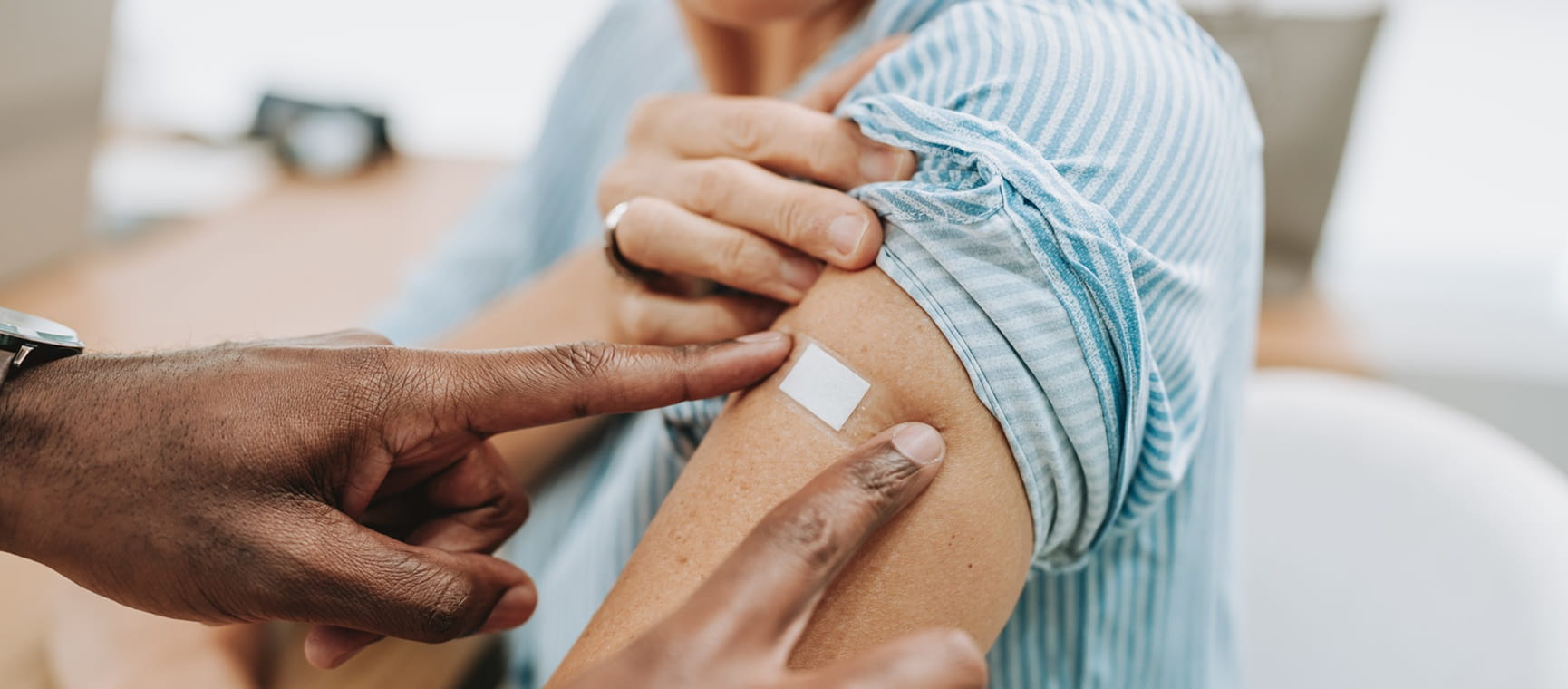Pneumonia: what are the symptoms and when should you seek medical treatment?
Everything you need to know about the lung infection, and how you could be ill with “walking” pneumonia without realising it.

Everything you need to know about the lung infection, and how you could be ill with “walking” pneumonia without realising it.

An inflammation of the lungs that’s usually caused by an infection, severe pneumonia kills 25,000 people a year in the UK. Milder types, such as the so-called “walking pneumonia”, however, can sometimes go undiagnosed.
For most healthy people, a bout of pneumonia is no more than a nasty chest infection that passes in a couple of weeks or so, sometimes needing antibiotics if it’s caused by a bacterial infection.
“The less severe your symptoms are then the less likely you are to be diagnosed with pneumonia because you will push through and carry on with your daily activities and might not even see a doctor,” says Dr Micheal Zemenides, co-founder of The A-Z General Practice at the HCA Wellington Hospital in north London.
“This is known as ‘walking pneumonia’ and is caused by a particular strain of bacteria called mycoplasma pneumoniae, and the infection tends to be milder. You may have a persistent dry cough and feel unwell, but well enough to just carry on.
“However, it is still a lung infection and needs treatment and monitoring.”
Dr Andy Whittamore, GP and clinical lead at the charity Asthma and Lung UK, points out that pneumonia is part of a spectrum of chest infections ranging from mild to severe disease.
“Some people will respond well to antibiotics – especially if there is evidence of bacterial infection – and get better quite quickly,” says Dr Whittamore.
“Others can get worse and end up in hospital and in some cases need life support or die. It really is a spectrum.
“In vulnerable groups such as the over 65s and those with chronic heart, lung, and kidney conditions or diabetes, pneumonia can be much more serious.”
There were a quarter of a million emergency hospital admissions due to pneumonia in England in 2023/24, a 16% increase on the previous year, according to the latest figures.
“Pneumonia is an infection of the lungs,” explains Dr Zemenides. “It causes the air sacs in the lungs – called alveoli – to fill with fluid, mucus, or pus, which makes it harder to breathe and for the body to get enough oxygen.
“I always think of the lungs as an upside-down tree with a really thick tube at the top which allows you to breath in air in adequate volumes and then as you move down, you get smaller and smaller branches. At the end of these branches where the leaves would be on a tree, you have air sacs with very thin walls that allow oxygen to pass from the lungs into the bloodstream.”
Dr Zemenides says that if an infection causes the air sacs to become inflamed and fill with fluid and mucus, then the transition of oxygen into the bloodstream becomes more difficult, causing breathing difficulties and putting a strain on other organs.

Hospital-acquired pneumonia (caught in hospital) tends to affect sicker, older, or immunocompromised people or those with underlying health conditions.
It has a higher death rate and results in a longer hospital stay than community-acquired pneumonia (acquired outside a healthcare setting), according to one study.
“The older people are the more likely they are to have other medical conditions such as heart, lung or kidney disease or diabetes,” says Dr Zemenides.
“The lungs also become less elastic and less efficient over time, particularly if you have chronic lung disease.
“For example, your cough reflex can weaken, which can make it easier for bacteria or viruses to stay within the lungs and means they can multiply within those areas, and in certain cases the immune system can weaken, which makes it harder to fight off the infection itself.”
Those who are more vulnerable if they catch pneumonia include: people with a chronic lung disease such as asthma or chronic obstructive pulmonary disease (COPD); heart disease; diabetes; kidney disease; a weakened immune system; a history of smoking; or have had a stroke and have swallowing difficulties, you are more vulnerable if you catch pneumonia.
“If there’s less oxygen in the blood and you have an underlying medical condition such as heart condition, this will put additional strain on the heart forcing it to work harder to pump blood around to your other organs and keep them supplied with oxygen,” says Dr Zemenides.
“Pneumonia can be caused by bacteria, viruses or fungi,” says Dr Whittamore.
“Common causes include bacterial infection such as Streptococcus pneumoniae (also known as pneumococcus); Haemophilus influenzae; Staphylococcus aureus; Legionella pneumophila (which causes Legionnaire’s disease); and mycoplasma pneumoniae.”
Viral infections including flu and respiratory syncytial virus (RSV), Covid-19 and some fungi are other causes.
Aspiration pneumonia can be caused by food going down your windpipe into your lungs instead of through the oesophagus to the stomach; by inhaling vomit; breathing in harmful chemicals such as smoke; or swallowing a foreign object.
“Symptoms of pneumonia include a dry cough or a cough where you bring up green phlegm,” says Dr Zemenides.
“You may also have either a fever or a chill. Sometimes you may have chest pain, especially if your cough is severe and has caused muscle strain or is caused by inflammation of the airways. You may also notice that you have shortness of breath when you cough or breathe, and symptoms of generalised weakness and fatigue and a loss of appetite.
“In older adults, you can get other symptoms such as confusion and a change in alertness, and difficulties in walking.”
Dr Zemenides says that people with pneumonia can experience a high fever or a lower-than-normal temperature.
Pneumonia symptoms tend to come on slowly over a couple of days.
“Basically, we recommend that if someone has trouble breathing, has chest pain or a high fever that is not improving with paracetamol and ibuprofen, or has been on antibiotics and symptoms are getting worse, they should seek medical help right away, either through their GP, by calling 111 or going to A&E,” says Dr Zemenides.
“Pneumonia can be diagnosed by your doctor taking your history of symptoms and examining you appropriately with a stethoscope,” says Dr Zemenides. “This can pick up signs of infection in your lungs.
“They would also check your temperature, blood pressure, pulse, respiration rate (by counting how many breaths you take in a minute), and oxygen levels. Chest X-rays can also diagnose pneumonia, but these are only done in a hospital setting.”
Dr Whittamore says that part of making the diagnosis will be your doctor assessing how your symptoms are impacting your daily life.
“I’d be asking ‘Is the infection making you breathless?’” and ‘Are you so breathless that you can’t do normal things?’,” says Dr Whittamore.
“If you are coughing up blood, then that might be a sign of something else going on – either the pneumonia infection or maybe clots on the lung, or cancer, and that needs investigating.
“If your heart is racing or you have low blood pressure, these are signs that your body is having to work very hard to fight off the infection and this would suggest you need urgent hospital care. But if you didn’t have these symptoms, you could be treated for pneumonia at home.”

Pneumonia can lead to severe breathing difficulties, low oxygen levels, sepsis (an infection spreading into the bloodstream), organ failure and respiratory failure, sometimes requiring hospitalisation or oxygen therapy.
“This is why pneumonia can be life threatening, particularly for older adults,” says Dr Zemenides.
Treatment depends on the cause of the pneumonia infection.
“In most cases, people recover from pneumonia in a few weeks, but with a bad case it can take three-to-six months to get fully back to normal,” says Dr Whittamore.
“You might be left feeling very fatigued, run down and lethargic, and confusion may persist, as your body has used up so much energy fighting the infection.”
“It’s really important to stay up to date with all the recommended vaccinations for flu, Covid-19, RSV and the pneumococcal vaccine,” says Dr Zemenides.
“Vaccines are highly effective at reducing the chances of you catching pneumonia, limiting the severity of illness if pneumonia does occur, and cutting the risk of hospitalisation and death.”
Pneumococcal pneumonia is caused by one strain of bacteria called Streptococcus pneumoniae (it can also cause meningitis and sepsis). Since the pneumococcal vaccine was introduced in 2002, the number of people dying from pneumonia complications has fallen to 7%.
“It’s also important to go for check-ups to ensure any underlying health conditions such as asthma, COPD, heart disease, and diabetes are being well managed,” adds Dr Zemenides.
“Washing your hands and covering your mouth and nose with a tissue when you cough or sneeze both lower the risk of transmitting infection.
“Stopping smoking if you are a smoker, staying hydrated, eating healthily and ensuring your medical conditions are well controlled will reduce the risk of developing serious complications.”
(Hero image credit: GettyImages)
Jo Waters is an award-winning health and medical journalist who writes for national newspapers, consumer magazines and medical websites.
She is the author of four health books, including What's Up with Your Gut? and is a former chair of the Guild of Health Writers.


Saga offers escorted tours throughout Europe and as far afield as Canada, Australia and even Uzbekistan, plus hotel stays in popular European hotspots including Spain, Portugal and Greece.
Find your perfect holiday today.

Are you retiring at the wrong age? The best age to retire for your body, brain, happiness and pocket.


Everything you need to know about the lung infection, and how you could be ill with “walking” pneumonia without realising it.

Strong calves for a strong mind: how they support our circulation and brain health, with easy moves to strengthen yours at home.


Our GP Dr Mark Porter explains what can cause itchy skin, which is a common problem as we get older.

Worried you’ve morphed into Victor Meldrew? Find out how to battle that bad mood, and what to do if you’re stuck with a grouchy loved one.

The benefits of heat and cold therapy, and how Nordic bathing won over our nervous writer.

Here’s how to spot the symptoms of heat disease and reduce your danger.


The NHS winter vaccination campaign kicks off next week. Here’s the lowdown on what you need to book.

Pilates for back pain – what to do if you are suffering, and five gentle exercises that could help.

Dizziness or vertigo: a sensation of spinning, can stop us doing everyday things for fear of falling. Try these tips to stop feeling dizzy


You don’t have to put up with bladder leaks. We try out the latest pelvic floor gadgets for men and women.

Cataracts are a normal part of ageing. Learn how to spot the signs – and when it’s time to consider surgery.